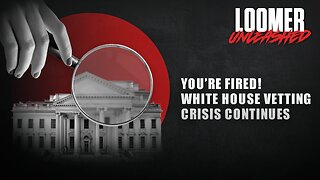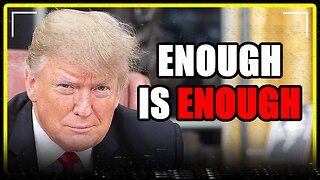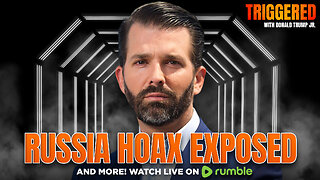Premium Only Content

Insurrection Doomed The Star Trek TNG Movies, Not Nemesis
Insurrection Doomed The Star Trek TNG Movies, Not Nemesis
Star Trek: Insurrection undid First Contact's gains for the TNG film franchise. The following movie, Star Trek Nemesis, never really had a chance. Star Trek: Insurrection undid Star Trek: First Contact's gains to the Star Trek: The Next Generation film franchise so that its follow-up, Star Trek Nemesis, was likely doomed to failure no matter its quality. After six largely successful films starring the cast of Star Trek: The Original Series , the torch was passed to the highly popular cast of TNG in Star Trek Generations, which finally saw Captain James T. Kirk (William Shatner) and Captain Jean-Luc Picard...
Star Trek: Insurrection undid First Contact's gains for the TNG film franchise. The following movie, Star Trek Nemesis, never really had a chance. Star Trek: Insurrection undid Star Trek: First Contact's gains to the Star Trek: The Next Generation film franchise so that its follow-up, Star Trek Nemesis, was likely doomed to failure no matter its quality. After six largely successful films starring the cast of Star Trek: The Original Series , the torch was passed to the highly popular cast of TNG in Star Trek Generations, which finally saw Captain James T. Kirk (William Shatner) and Captain Jean-Luc Picard (Patrick Stewart) team up in the film's climax. While Generations certainly has its problems, it was a financial success and paved the way for more TNG films. The next entry in the TNG film franchise, Star Trek: First Contact, was a huge critical and financial success, seemingly justifying Paramount's decision to end TNG's television run early and pursue big-screen adventures. Unlike the more thoughtful, introspective TNG television series, First Contact was an unabashed action movie, revamping Captain Picard as something of a 24th-century John McClane as he battled the Borg aboard the USS Enterprise-E. Jonathan Frakes - who also portrayed Commander William Riker - proved himself a dynamic director, and the immediate future of the TNG film franchise seemed bright. Why Insurrection Was The Real Doom Of The TNG Movies The problems with Star Trek: Insurrection began at its inception. Screenwriters Ronald D. Moore and Brannon Braga, who wrote both Generations and First Contact, were unavailable, so executive producer Rick Berman brought in veteran writer Michael Piller to craft the new film's script. Piller was no stranger to Star Trek, having been the head writer on TNG where he wrote classic episodes, and co-creator of both Star Trek: Deep Space Nine and Star Trek: Voyager . But Piller was not quite ready for the deluge of notes from producers, executives, and actors he'd have to consider for Insurrection, which went through several major rewrites. The end result of Star Trek: Insurrection confused even its cast, with a story lacking focus, compelling antagonists, and centered on some murky moralizing on the part of the beloved TNG crew. Frakes seemingly took a step back as a director, grappling with lousy-looking CGI effects and bland locations that looked a lot more like Southern California than alien worlds. Insurrection is often compared to a two-part episode of TNG, but that standard doesn't quite cut it when Star Trek: Insurrection has to meet the lofty expectations of a theatrical release and follow the wildly successful First Contact. Insurrection Misunderstood The Appeal Of TNG Star Trek: Insurrection ultimately framed the TNG crew as righteous rebels taking on a jaded, out-of-touch Starfleet Command that wanted to relocate a few hundred colonists from the planet Bak'u. It's a trope Star Trek has revisited often, and when Patrick Stewart starts making speeches about sovereign rights and non-interference, it's easy to get swept up in Captain Picard's passion. But the Bak'u were not native to the planet, where the atmosphere could conceivably heal billions of people, an important point for Starfleet in the midst of the Dominion War. Picard is quite simply wrong in Insurrection, allowing his personal feelings to overshadow the greater good. Star Trek: Insurrection was greeted with middling reviews and soft box office, which kicked off a general decline in Star Trek's popularity in the late 90s. DS9 and Voyager were never the ratings powerhouses that TNG was, and Star Trek: Enterprise was canceled after season four. Insurrection's lukewarm reception and the overall slide of the franchise created a four year gap after Insurrection before Star Trek...
-
 3:05:49
3:05:49
TimcastIRL
8 hours agoNew DOCS PROVE Obama Hillary CONSPIRACY To SABOTAGE Trump Admin | Timcast IRL
217K94 -
 2:29:36
2:29:36
Laura Loomer
8 hours agoEP136: YOU'RE FIRED! White House Vetting Crisis Continues
58.8K39 -
 8:07
8:07
MattMorseTV
8 hours ago $6.31 earnedTrump just LOWERED PRICES by 75 PERCENT.
35.6K34 -
 LIVE
LIVE
Misfit Electronic Gaming
11 hours ago $4.37 earned"LIVE" "Blind Descent' +"Dollhouse of Dead" Playtest 10 Followers till we hit 1000! We CAN do this!
518 watching -
 21:53
21:53
Glenn Greenwald
10 hours agoMichael Tracey on the Street: What Do People Think of the Epstein Case?
127K58 -
 2:26:28
2:26:28
megimu32
7 hours agoOTS: Board Games Gone Wild! The Loud, Weird & Chaotic Games That Raised Us
37.6K9 -
 4:25:16
4:25:16
DamnDanieI
8 hours agoKill First, Loot Later – OTG Live
55.3K1 -
 56:41
56:41
Donald Trump Jr.
12 hours agoLies, Leaks, and Lawfare: Censorship Corruption Exposed | TRIGGERED Ep.263
180K161 -
 1:19:46
1:19:46
Precision Rifle Network
9 hours agoS4E25 Guns & Grub - Rex Is Back, I shot the 6.5PRC finally...
33.9K1 -
 5:42:52
5:42:52
rhywyn
6 hours agoうつ
20.7K4